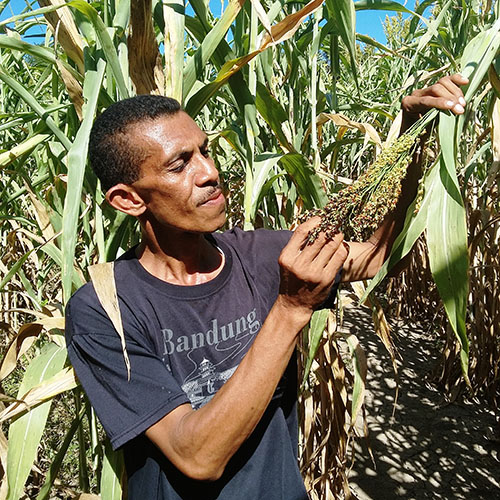Stories of Change

Maxi inspects his sorghum.
CWS efforts in Indonesia positively impacted more than 17,000 people in 16 communities last year.
Source: CWS Annual Report 2017
Crop diversification for better family diets in Indonesia
Maxi Taneseb and Fince Yane Baifeto live in a small village in West Timor with their three children. Because of their poverty and ambition to live better, the family joined CWS in Timor Zero Hunger activities in January 2017. With CWS support, they started to improve the way they grew vegetables and raised chickens, and they also started working towards better access to clean water and a family toilet – something they did alongside others in Noemuke village who also wanted to improve their economic status for better food security and their children’s health and nutrition.
When we spoke to Maxi recently to see how the family is doing, he said, “One of the biggest problems we face is not having enough food – almost every year,” So, with CWS support his family and their neighbors joined a pilot project to learn about growing sorghum to diversify their staple crops. We planted sorghum in the past,” Maxi recalled, “but I haven’t seen anybody planting it for more than 20 years, and I don’t know why. In the past we planted it together with corn; but the yield from sorghum was quite low compared to corn and people also did not know its nutritional value”.
Since Timor Zero Hunger focuses on helping families consider alternative crops and ways of growing them, the idea of returning to sorghum was raised and Maxi planted 10 acres of the crop when, he noted, “We learned from the CWS team that sorghum grows best when it’s not planted together with other crops.” With this, he continued, “I harvested about 200 kilograms (441 pounds) of sorghum. That’s pretty good [since we have had so little rain]. If there is more rain, 10 acres should yield 300 to 350kg (660 to 770 pounds). But, if rainfall is lower, which is happening a lot now, the yield will be only about 100 kilos. “[For now] I’m happy because my family has food other than corn that I now know is really nutritious. So, I’m proud that my family and I have been able to set an example for our neighbors. Sorghum is ideal for our dry climate as it does not require a lot of water” – something that many Indonesian farming families must now consider given their climate’s shift toward less and less rain.
